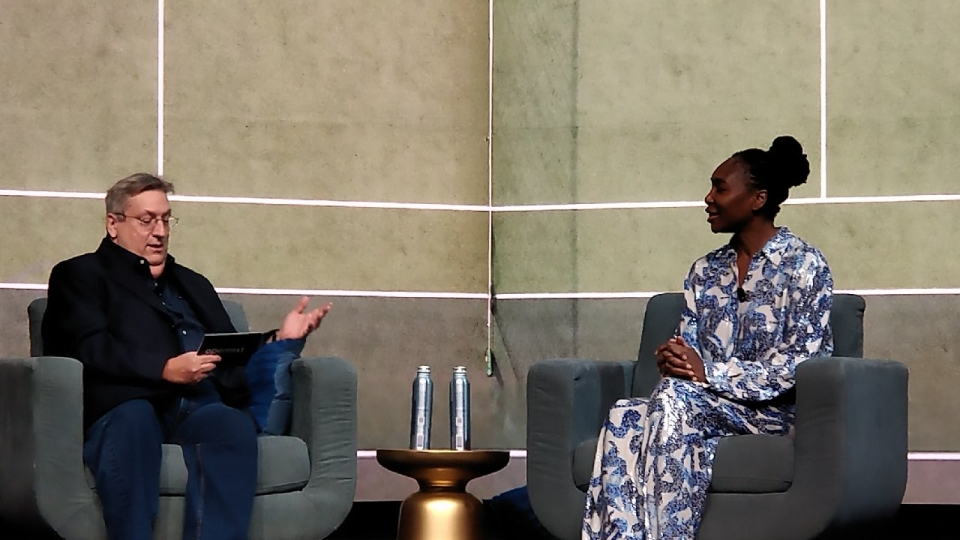
$6 billion-revenue OpenText has turned itself from a content management company rivalling Adobe, to an information management firm to seriously rival the likes of Oracle in only a few years, thanks to organic development and a combination of strategic and large acquisitions. In line with the growth, the company’s channel has grown substantially with many tens of thousands of partners now flying the OpenText banner.
IT Europa sat down with OpenText CEO Mark Barrenechea (pictured above with tennis champion Venus Williams during a conference talk) at last week’s OpenText World annual customer and partner event in Las Vegas, to find out about channel opportunities going forward.
Barrenechea talked about on-demand software: “We’re introducing XDR [extended detection and response] as-a-service on the data security side of things next January. And we want to make more on-demand products that are the equivalent of our heritage products. That’s important as we want to make multi-clouds work. We were late to SaaS, but not to AI.”
With what it sees as the completion of its Titanium X cloud delivery roadmap and strategy, OpenText says it is continuing to spearhead the digital transformation journey, unlocking new opportunities through its suite of solutions for business cloud, business AI, and business technology.
And on AI, Barrenechea says: “You can see our AI progress, with AI agents being able to make the decisions from your data analytics, and now we are moving towards agentic AI, where you can use agents on their own to decide what is the best way to use your data. You really can leave the machines to do the work.”
On OpenText’s AI role: “AI is in layers, you have the silicon layer, the tools layer, the development layer, and the applications layer – this is where we’re putting in the energy, customer data is not our problem, we just make sure its protected in our applications, we don’t own it or use it.”
On using OpenText software to create a single corporate help-desk, he says: “We’re talking about a single desk to deal with everything: IT, HR, supply chain, and everything else, that addresses main business operations. Such technology will help to close data breaches and increase efficiencies.
“Maybe all this will take a couple of years to deliver. But it will deliver productivity improvements. The cost of the service may well go up as well. So will customers pay for it? Against some of our competitors, with this technology, we will win more, that’s for sure.”
OpenText is a Canadian company listed on Nasdaq. On the new incoming US administration, and its potential impact on the technology industry, Barrenechea gives a measured response. “We already work with multiple US government agencies, including the FBI, and for government agencies around the world. Whatever the politics, I just look for good government policy. If the next US government was looking to consult the technology industry on particular strategies, it would be nice to be consulted along with others.”
On energy efficiency and sustainability: “I like to use the term ‘nature positive’, that is the overall intention. You have to rely on partners to make a difference sometimes, but we are using more hydro power than ever to support our workforce.
“In the case of AI though, it will be a case of “taking from nature” before we give back, considering the data processing needs of the hardware being used at the moment.”
On OpenText business performance: “We are a profitable company that is still digesting our big Micro Focus acquisition [completed in January 2023]. We’ve divested ourself from the mainframe business, and we have to get the Micro Focus assets to their best ASAP.
“We have expanded our security services business, and we have become a true information management company from our content management roots. Our return from capital is high, and we are growing in cloud services from a low base, so there is plenty to be happy about.”
Going back to Micro Focus, which was captured through a mammoth deal valued at $6 billion: “We’re on our way to making Micro Focus its best, but soon after buying it interest rates went up, inflation went up, and then we sold the mainframe part of it. And then of course, AI suddenly came along after the transaction, so we had to move in an additional direction. Maybe it will take a little longer than we thought originally to make the best of it.”
On managed service providers, the company has around 18,000 MSP partners globally: “We like the mid-market, and we’ve bought a number of companies to grow that market. They all help us to grow our MSP business, and get into the Microsoft part of it in a big way, by integrating our products with Microsoft ones.”
As OpenText has evolved over the years, it’s been an interesting watch, and there’s clearly plenty more to come.


